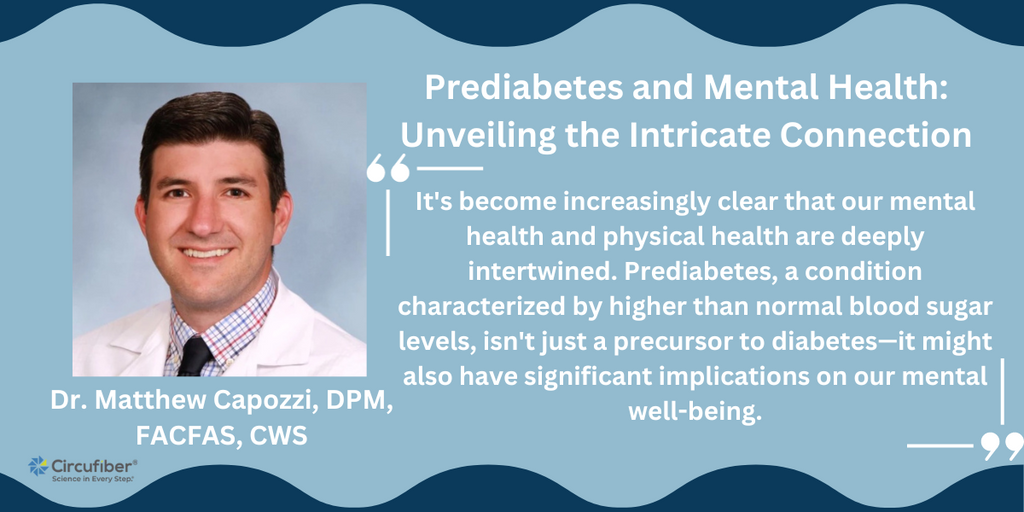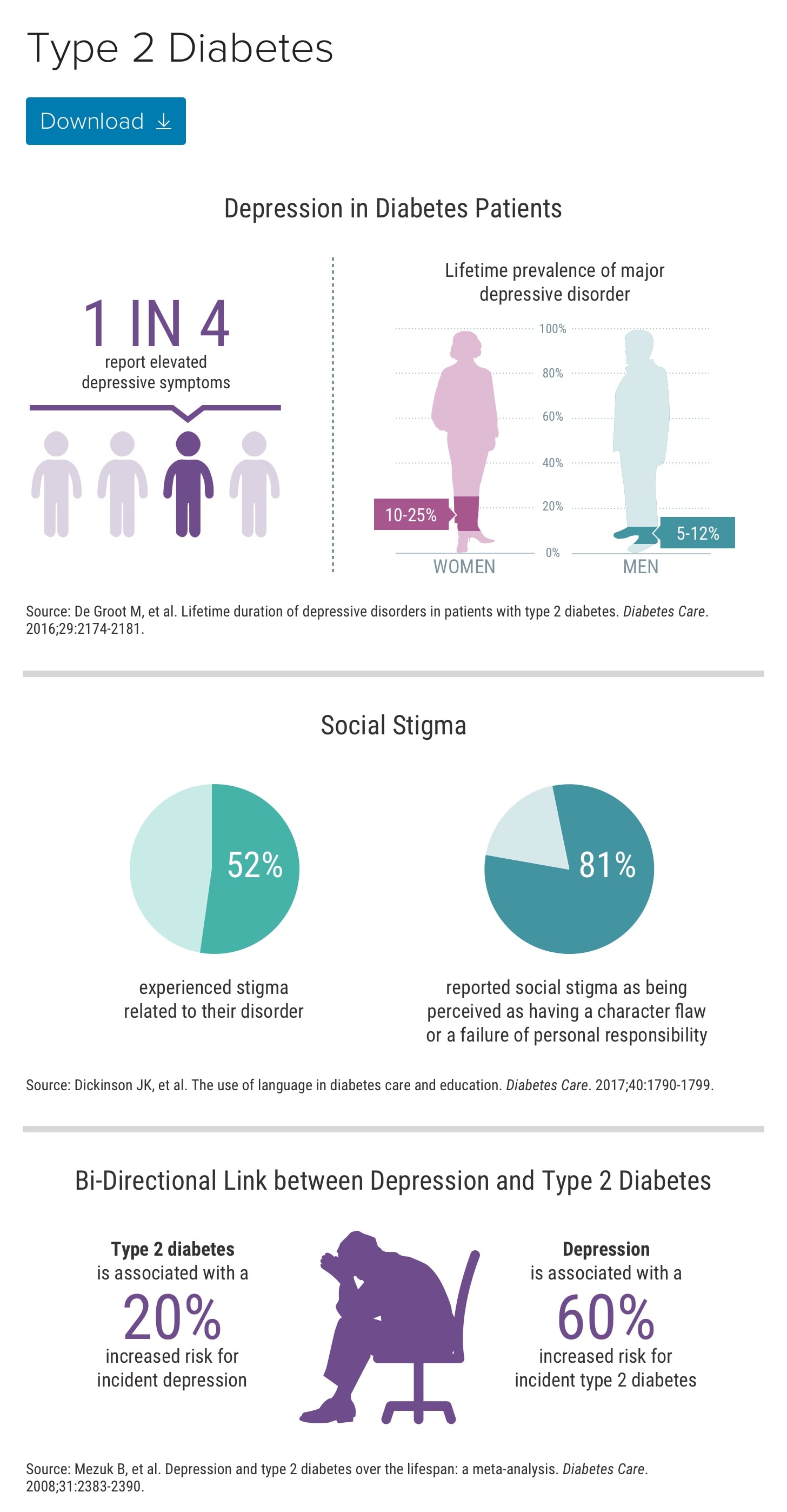Medically Reviewed by:Scientific Advisory Board
It's become increasingly clear that our mental health and physical health are deeply intertwined. Prediabetes, a condition characterized by higher than normal blood sugar levels, isn't just a precursor to diabetes—it might also have significant implications on our mental well-being. 
We've all heard of the physical risks associated with prediabetes, but it’s time we shed light on its potential psychological impacts as well. Emerging research suggests that individuals with prediabetes may be more likely to experience mood disorders, anxiety, depression and other mental health issues.
By acknowledging these links between prediabetes and mental health, we can better equip ourselves to manage both conditions simultaneously—improving overall quality of life in the process.
Understanding Prediabetes and Its Risk Factors
Prediabetes, as we all know, is a health condition where blood sugar levels are higher than normal but not high enough for a diagnosis of type 2 diabetes. It's like the alarm bell that rings before the fire. Now let's delve into what prediabetes really entails and look at its risk factors.
One major culprit we cannot ignore is age. As you grow older, particularly after 45 years, your risk of prediabetes increases. But this doesn't mean younger people are immune; unhealthy lifestyle choices can make anyone susceptible. There’s also a genetic component to it - if someone in your family has been diagnosed with diabetes or prediabetes, odds are you're at risk too.
Moving on to body weight and physical activity – both crucial factors when discussing prediabetes risks. Being overweight significantly ups your chances of developing this condition, especially if excess fat is mostly around the abdominal area. On flip side, leading an active life reduces these risks.
- Age above 45 years
- Family history of diabetes
- Overweight
- Abdominal Obesity
- Sedentary lifestyle
Another important factor to consider is gestational diabetes – simply put, if you developed diabetes while pregnant or gave birth to baby weighing more than nine pounds, your chances of having prediabetes later in life increase.
Certain ethnic groups including African-Americans, Hispanics, Asian-Americans and Pacific Islanders have been noted to be at higher risk too. Unfortunately though there’s nothing much one can do about their race or ethnicity.
In addition stress and poor sleep habits can contribute towards onset of prediabetes; these factors indirectly influence our eating patterns and physical activity levels leading us closer towards the tipping point that is full-blown type 2 diabetes. Finally yet importantly is hypertension or high blood pressure which often walks hand-in-hand with prediabetes due its link with insulin resistance.
The Connection Between Prediabetes and Mental Health
Venturing into the realm of prediabetes, we're met with a complex interplay between physical health and mental well-being. Research suggests that individuals with prediabetes often navigate not only the physiological implications of this condition but also the psychological ones.
Data collected by the American Diabetes Association reveals an unsettling pattern: folks with prediabetes are approximately 20% more likely to suffer from anxiety and depression compared to those without this condition. These conditions can manifest as chronic stress, feelings of despair, or overwhelming anxiety which can further exacerbate blood sugar levels.'
In a study conducted by The Lancet Psychiatry journal, they found that people diagnosed with diabetes had a 32% higher risk of developing mood disorders like depression. For those in the prediabetic stage, the threat looms large. This could be due to multiple factors:
- Fear of Future Health Problems: Prediabetes is essentially a warning sign for Type 2 diabetes. This impending uncertainty about future health can take a toll on mental health.
- Lifestyle Changes: Adapting to new dietary restrictions and exercise regimens can induce stress.
- Hormonal Fluctuations: Unstable blood glucose levels can affect mood and energy levels.
| Condition | Increased Risk |
|---|---|
| Anxiety | 20% |
| Mood Disorders (Depression etc.) | 32% |
On another note, it's worth mentioning that there's no one-size-fits-all approach when it comes to managing both mental health issues and prediabetes simultaneously. It often requires personalized care plans that address both physical and emotional aspects associated with these conditions.
Bottom line? We need to broaden our understanding about how closely intertwined our physical health is with our mental well-being—especially when dealing with something as pervasive as prediabetes. By recognizing this connection early on, we'll be better equipped to provide comprehensive care that truly addresses the needs of individuals grappling with these dual challenges.
Impact of Mental Health on Prediabetic Patients
We're beginning to realize just how much our mental health can influence physical conditions like prediabetes. Stress, anxiety, and depression are often linked with higher blood sugar levels—that's a fact we shouldn't ignore.
Let's dive into some of the statistics. Research reveals that people suffering from depression have a 60% increased risk of developing type 2 diabetes. It seems that high stress levels can lead to weight gain and increased belly fat, which are significant risk factors for prediabetes and diabetes.
Here's another startling statistic: nearly half of those diagnosed with depression also have diabetes. And in this intertwined relationship between mental health and prediabetes, it's not always clear which condition comes first—does poor mental health contribute to the development of prediabetes, or does being diagnosed with a chronic illness like prediabetes lead to stress and other psychological symptoms?
In light of these findings, it becomes crucial that we address both our mental and physical well-being simultaneously. Ignoring one aspect can cause the other to suffer—and vice versa:
- Regular exercise is known to combat stress levels while lowering blood sugar.
- Healthy eating habits improve mood swings as well as manage weight—an important factor in preventing diabetes.
- Practices such as mindfulness meditation help reduce anxiety while encouraging healthier lifestyle choices.
The connection between mental health and prediabetes isn't merely anecdotal—it's backed by research too. So let’s make sure we don’t underestimate its importance. By taking care of our minds along with our bodies—we'll be doing ourselves a huge favor in managing conditions like prediabetes more effectively.

Effective Management Strategies for Prediabetes and Mental Health
Navigating the path of prediabetes can be overwhelming, especially when mental health issues are part of the journey. However, with effective management strategies, it's possible to maintain a balanced lifestyle while keeping both conditions in check.
One of the most crucial steps is adopting a healthier diet. This doesn't mean you need to ditch all your favorite foods at once. Take small steps towards reducing sugars and unhealthy fats from your diet. Add more whole grains, lean proteins, fruits, and vegetables instead.
Physical activity plays an equally important role in managing prediabetes and improving mental health. Regular exercise helps control blood glucose levels and boosts mood-enhancing chemicals in our brain. It's not necessary to engage in strenuous workouts; even brisk walking or cycling for 30 minutes five days per week can make a difference.
Keep tabs on your mental wellbeing too. Stress can adversely impact blood sugar levels making it harder to control prediabetes. If you're feeling overwhelmed or anxious, don't hesitate to seek help from healthcare professionals or support groups.
Medication may also be required depending on individual circumstances - always consult with your doctor before starting any new medication regime.
Here are some key points:
- Adopt a healthy diet by reducing sugar and unhealthy fats
- Engage in regular physical activity like walking or cycling
- Monitor mental wellbeing regularly
- Seek professional help if stress becomes unmanageable
- Consult with doctors about medication options
It's essential that we understand there's no one-size-fits-all approach when managing prediabetes and mental health concerns together - what works for one person may not work for another.
Conclusion: Overcoming Challenges in Prediabetes and Mental Health
We've reached the end of our journey, exploring the intricate connection between prediabetes and mental health. It's become clear that managing these two can be like walking a tightrope, but with the right tools, we can overcome these challenges.
Living with prediabetes doesn't have to mean living under a cloud of fear or anxiety. Knowledge truly is power when it comes to facing this health condition. Arming yourself with accurate information about your body's needs and responses can make all the difference.
Stress management plays a crucial role in maintaining both physical and mental wellbeing. Simple practices like regular exercise, mindfulness meditation, and adequate sleep often go a long way in alleviating stress levels.
Here are some key takeaways from our exploration:
- Prediabetes often goes hand-in-hand with mental health issues such as depression or anxiety.
- Lifestyle changes play an integral part in managing both conditions effectively.
- Regular check-ups are essential for monitoring physical health while therapy sessions may prove beneficial for mental wellbeing.
Now let’s break down these points further:
| Key Takeaways | Description |
|---|---|
| Prediabetes & Mental Health Connection | Often coexist due to shared risk factors such as poor diet, lack of exercise, and high stress levels |
| Lifestyle Changes | Healthy dieting, regular exercise, sufficient sleep help manage both conditions |
| Regular Check-ups & Therapy Sessions | Vital for tracking progress and treatment effectiveness |
Remember that managing prediabetes isn’t just about preventing diabetes—it’s about improving overall health too. By combining proactive lifestyle changes with professional medical advice, we can turn what might seem like an overwhelming challenge into a manageable task.
Research, Studies and Sources:
https://www.cdc.gov/diabetes/managing/mental-health.html
More About Circufiber.com and Healthcare disclaimer:
Always consult your physician before beginning any program. This general information is not intended to diagnose any medical condition or to replace your healthcare professional. If you experience any pain or difficulty, stop and consult your healthcare provider. Circufiber.com socks are clinically proven to improve micro-circulation in feet and lower extremities in people with Diabetes.
More Author Information:
Dr. Capozzi is a board-certified foot surgeon through the American Board of Foot and Ankle Surgery. He is a Diplomate of the American Academy of Wound Management and Fellow of the American College of Foot and Ankle Surgeons. He completed a three-year residency program in Foot and Ankle Reconstructive Surgery at St. Francis Hospital & Medical Center in Hartford, CT in 2010. Dr. Capozzi is a board-certified Wound Specialist® granted by the American Academy of Wound Management. He is also board-certified in Foot Surgery through the American Board of Foot and Ankle Surgery.




